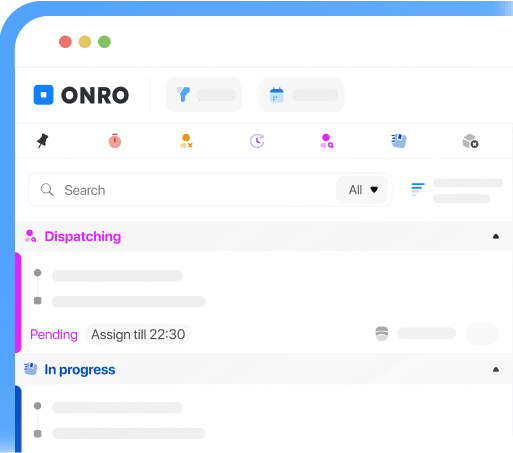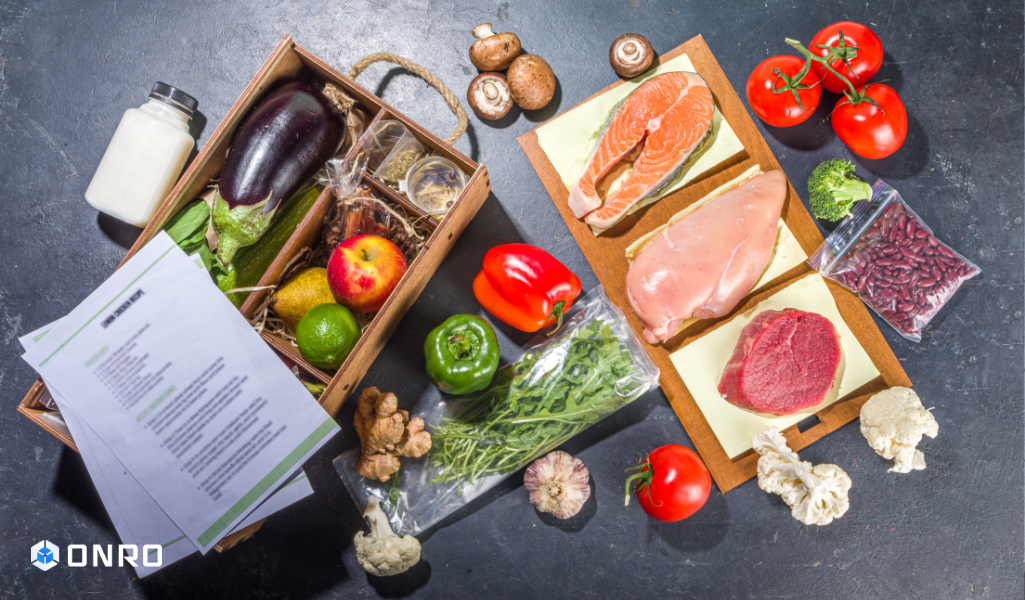Have you ever wondered what businesses might do in order to keep pace with the increasing demand to deliver more and more quickly and easily?
A cargo van business acts as the backbone of last-mile delivery logistics, carrying goods directly to the customers’ doors on behalf of the company. Cargo vans are popular because they can serve a range of industries from eCommerce to catering, medical transport, and more.
What you need to start your own cargo van delivery business when you want to start a delivery business, its advantages, and how to make it a successful venture are all in the all-inclusive guide. Be it the aspiring entrepreneur, or one eyeing to extend his/her logistics capability, this post got you covered for successful execution.
Try Onro for Free
Get your free access to the Onro All-in-one Delivery Management Software.
What is Cargo Van Business?
Delivery management services using cargo vans have become one of the major segments in modern supply chain logistics where things are trans-shipped using flexible cargo vans. Such vehicles are fully suited for solutions that cater to last-mile delivery. With growing eCommerce, the cargo van assist will prove more and more instrumental in fast and reliable deliveries that assure customer satisfaction.
Cargo van services have become fundamental for the most demanding delivery centers in metropolitan areas, such as eCommerce stations, storefronts of local businesses, and even mainstream retailers. In addition, they offer their services to specific markets, such as pharmaceuticals, perishables, and fragile goods. Cargo vans are primarily point-to-point and will constitute a good portion of all supply chain business success.
Knowing what makes flexible cargo vans and what market niches they serve is important for an entrepreneur to strategically position himself or herself in the emerging industry using the area for growth and success in last-mile delivery logistics.
9 Steps to Start a Successful Cargo Van Business
Step 1. Define Your Business Concept
Find your niche-local moving, delivery, and hauling are all parts of it. Market research will help you find and understand local demand as well as competition in your area and also potential customers. Setting up short-term goals and long-term ones later on makes your business clear and flexible. It helps set a solid understanding of the market, which in turn helps one plan and avoid careless decisions. A great business idea helps guide the other steps and places you in a better position to win at times an industry is very competitive.
Step 2. Create a Business Plan
A business plan is a living representation of your idea. Start briefly with an outline to sketch out the small things that you want to achieve with the business. Market yourself across: study competition and profile your target market. Offerings and marketing will also explain your business plan.
Improved finance forecast, start-up cost drying up, price, and possible income from sales will be part of it. The proposal will also incorporate an operational plan covering logistics and day-to-day activities. You understand that a clear plan keeps a business on track and prepares for challenges.
Step 3. Handle Legal Requirements
Select the appropriate business structure like LLC, sole proprietorship, or a corporation-for your requirements. Register a business name and get the Employer Identification Number (EIN) for tax administration purposes.
Apply for a business license and the required relevant licenses and permits like a Commercial Driver’s License (CDL). Meet local and state statutes. Fill in a taxpayer registration and operate in case you need the operating authority for interstate operations. Finally, determine the proper legal setup to keep things running smoothly without any future disruption from the legal authorities.
Step 4. Secure Financing
List your fund’s requirements, including your van, equipment, insurance, and permits. Collate financial sources like personal savings, loans, and crowdfunding to cover these costs. You may want to make use of a separate business account to control and monitor the flow of cash. You might want to continue with another job during this time, as establishing an actual business takes longer than you think. Proper financial management will help you to have money in the beginning stages to cover initial costs and fund early operational needs.
Step 5. Acquire the Right Cargo Van
Choosing a cargo van is primarily based on how it meets the business needs from size, gas mileage to price. First, check on Ford Transit and Mercedes Sprinter. Within these lines should be mentioned other cargo models that might cater more closely to your affordable and needed standards.
You can then decide between buying a new, used, or leased van. Equip all necessary equipment, dollies, straps, and GPS systems for ensuring the deliveries run smoothly. Getting the right vehicle and equipment means the smooth running of your company and satisfaction for your customers as well.
Step 6. Brand and Market Your Business
A memorable logo, a stunning website, or a captivating social media presence can create a distinct brand. Wraps or branding of your van with your logo and contact details would increase visibility to the public.
Enjoy planning a successful marketing strategy, such as through the digital tools SEO, Google Ads, and social media, to active people on search engines with a readily available delivery service. Branding and marketing will give awareness, build customer trust, establish credibility, and make it easier for a consumer to access a new business opportunity.
Step 7. Initialization of Operational Systems
Set up the complete business infrastructure for appointment, dispatch, and customer management systems. To have everything centered on the same concentration and quality, standard operating procedures (SOPs) must be established for picking, delivery, and customer service.
Develop a good route and schedule delivery system and investigate the possible application of the route optimization software. Finally, and most importantly, such systems would need to be in-between invoicing and accounting, customer communication, and future organization.
Step 8. Optimize Operations with Invest in Technology and Software
To the development of the business, one can enhance productivity with the aid of such delivery management software as Onro. This kind of optimization application would save much time and fuel consumption with route optimization. Such applications facilitate real-time tracking of deliveries with true, precise updates for clients. Some proof of delivery features guarantee accountability and professionalism.
All the same, managing logistics through these technologies makes the whole operation more efficient, inexpensive in running cost, and better for the customers. Hence, it improves the service offered and guarantees more satisfaction among its clients.
Try Onro for Free
Get your free access to the Onro All-in-one Delivery Management Software.

Step 9. Launch and Grow Your Business
Once you have completed all arrangements, it should be time to open your business and start marketing your services to the first clients. Use every available means, offline and online: social media, SEO, and local advertising deliver excellent customer service to create a strong foundation for word-of-mouth advertising. Ask for referrals and reviews as your client base grows. Regularly assess the strategy of your business and keep abreast with the trends in the market for your industry while considering fleet expansion or service diversification as your business develops.
Key Benefits of Starting a Cargo Van Delivery Business
You are now well aware of all the steps of owning and operating a cargo van. Perhaps it surprises you, if you know about the benefits Nowadays, many local businesses are adopting delivery of their goods through a cargo van to reduce operational overhead costs, and logistical hurdles, and increase profits. Here are some of the top three benefits:
1. Increased Delivery Capacity
Cargo vans are built or designed for a good load capacity to hold high deliveries at once and create a cab with enough space for more packages in a single trip. Such vehicles are important for businesses that experience either high order volumes or heavy loads at times.
Cargo vans can carry a parcel weighing heavier than a regular delivery vehicle because of the greater payload capacity of a cargo van compared with the delivery vehicle. These things can take in construction materials, meaning that even long and bulky packages, such as plasterboard and furniture, can fit inside.
2. Versatile Storage Options
Here are some things that a cargo van can carry for you: your furniture, equipment, and even very fragile items. This cubic measurement in feet is large enough for most loads as needed in the freight area. Depending upon the business requirements, you may also have different options for heights of the roof and wheelbase lengths available. Cargo vans can also be easily enhanced by installing shelving, bins, refrigeration units, coolers, racks, or similar items suited for their purposes. This fitting can help businesses maximize the efficiencies in these vans by customizing them according to delivery needs.
3. Faster Delivery & Branding Opportunities
Cargos are faster delivery agents and better maneuvering vehicles for urban spaces because they are smaller and nimbler than freight trucks. Smaller than most large trucks, a cargo van is ideal because it can park in tight spaces requiring very little parking space, and a Commercial Driver’s License (CDL) is not needed to operate it.
They travel fully fast and efficiently, thus making them very suitable for performing last-mile delivery machines that help achieve overall customer satisfaction. Cargo vans are also well-ascribed advertising vehicles.
Wrapping or vehicle graphics applied to your van transform it into a moving advertisement and increase the exposure of your brand. As per reports available with the American Trucking Association (ATA), a vehicle wrap can earn nearly up to 16 million impressions annually on users wearing your van wheels along the familiar routes of your locality.
What Can You Use a Cargo Van Delivery Business For?
The most appropriate delivery business types that will gain profit from this include businesses that utilize a cargo van for heavy lifting movement or for transporting many packages. Cargo vans, as compared to passenger vans, are built with very spacious rooms and large entry doors to facilitate the easy loading and unloading of the cargo by delivery drivers. Professional drivers trained to complement the highly specialized service efficiencies would be recommended.
This may include the following depending upon the requirement of the market or your business model:
- Furniture Deliveries or Moves: Movement of large pieces of furniture through house and commercial moves.
- Last Mile Delivery Services: From last-mile delivery of packages to people’s doorsteps, it essentially completes the distribution of any eCommerce supply chain.
- Catering Services: Food and beverages can be supplied to events or up to daily meal service for an individual according to quality.
- Flower Delivery: Deliver delicate floral arrangements safely to the customer.
- Medical Transports: Medical equipment, prescriptions, or sometimes, lab samples are time-sensitive, specialized deliveries.
- Mobile Pet Grooming Business: Van outfitted to groom pets at home.
- HVAC Technicians: Bring everything needed in service for heating, ventilation, and air conditioning systems.
- Moving Services: Bring all cleaning supplies and cleaning equipment to perform house or office cleaning jobs.
- Mobile Auto Detailers: Car detailing services travel from location to location but have everything needed to be loaded in your van.
Conclusion
Usually, the definition of a cargo van owner-operator is distance travel, immersing oneself into a range of different markets, developing flexible operations and scalable growth, making it possible through effective strategies, tools, and technologies to set forth on being a successful startup and highly profitable business with potential in this fast-expanding industry. Elevate your cargo van business with the state-of-the-art courier software from Onro to streamline operations, optimize routes, or offer customers real-time tracking. Enroll today and revolutionize your delivery services!
Try Onro for Free
Get your free access to the Onro All-in-one Delivery Management Software.


